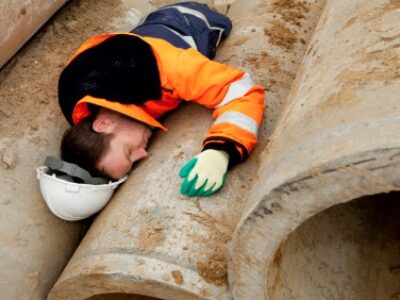As the adage goes, “it’s all fun and games until someone gets hurt.” In the workplace, the meaning of this expression becomes even more critical.
Most employers do not tolerate outrageous horseplay in the workplace. However, that does not always stop employees from engaging in unruly behavior. Unfortunately, this reckless behavior often puts employees at risk of injury. And these injuries are often not covered under California’s workers’ compensation laws.
Horseplay Is Not “Within the Course of Employment”
California’s workers’ compensation statutes are precise. They outline the specific conditions that enable an injured employee to receive compensation. Under the California Labor Code and the Division of Workers’ Compensation guidelines, an injury must arise out of and occur in the course of employment.
This requirement means that the injury must be tied directly to the performance of job duties or tasks reasonably related to work responsibilities. If an employee is injured while acting outside of those boundaries, the injury may not be compensable.
Therefore, injuries are not covered if they result from:
- Intentional or willful self-harm
- Criminal or negligent actions outside the scope of duties
- Horseplay or reckless conduct not tied to work responsibilities
This exclusion exists because horseplay is considered personal amusement, not an activity that furthers the employer’s business. Courts have long treated horseplay as outside the “course of employment” standard. For instance, in past rulings before the California Workers’ Compensation Appeals Board, claims arising from pranks or physical contests have been denied on the basis that the injury was unrelated to actual work.
What Is Considered Horseplay at Work?
Horseplay in the workplace encompasses a broad category that includes many different activities. It generally refers to behavior that is unnecessary, unsafe, and not related to work duties. Examples include:
- Practical jokes and pranks that create a risk of harm
- Roughhousing, play fighting, or wrestling with coworkers
- Races, contests, or dares during work hours
- Misusing machinery or operating equipment recklessly
- Throwing objects, climbing structures, or performing other unsafe stunts
To illustrate, if warehouse employees misuse forklifts for racing or personal amusement and one of them suffers an injury, the workers’ compensation insurance carrier may deny benefits. Even if the injury is severe, the fact that the activity was unrelated to job responsibilities makes it outside the scope of coverage.
Important Exceptions: When Horseplay Injuries May Still Be Covered
Although horseplay is generally excluded from workers’ compensation, certain exceptions may apply depending on the facts of the case.
- Innocent bystanders: If an employee is not participating in the horseplay but is injured as a result, their injury may still be covered. For example, if a worker is struck by equipment due to another employee’s reckless prank, the injured bystander could still pursue benefits.
- Employer tolerance or knowledge: If supervisors or management are aware of recurring horseplay and fail to enforce safety policies, it could affect liability. In some cases, courts may determine that the employer implicitly condoned the behavior.
- Workplace culture: In rare situations, if horseplay is ingrained in the workplace culture and routinely overlooked, an argument may exist that the activity was foreseeable or indirectly tied to employment.
- Supervisor involvement: If horseplay was initiated or encouraged by a supervisor, the circumstances could change the analysis of compensability.
Each of these exceptions is fact-specific. Past decisions of the California Workers’ Compensation Appeals Board demonstrate that even when horseplay is a defense, the outcome depends heavily on the evidence, workplace policies, and witness accounts.
Temporal and Comparative Context
California has consistently treated horseplay as outside the scope of employment. However, interpretations of what constitutes “horseplay” can evolve over time. In earlier decades, courts often adopted strict exclusions. More recently, some rulings have considered the broader context, such as whether the injured worker was an active participant or merely present at the time of the incident.
Compared to other states, not all apply the same standard. Some jurisdictions consider whether the horseplay was “minor” and incidental to work, while others maintain a blanket exclusion. This means employees in other states may have broader or narrower access to benefits depending on local laws. Understanding California’s stricter interpretation helps workers set realistic expectations.
Preventing Horseplay Injuries: Employee Responsibilities
Horseplay or jokes at work seem like harmless fun. However, that fun can quickly become dangerous. Of course, there is no problem with adding some amusement to the job and enjoying time with coworkers. But employees should always ensure that they:
- Avoid initiating reckless or unsafe behavior
- Decline to participate when pressured by peers
- Maintain focus on job duties and responsibilities
- Follow workplace safety policies and OSHA guidelines
Adhering to safety rules not only protects employees from harm but also preserves their eligibility for workers’ compensation in the event of a legitimate workplace accident.
Employer Responsibilities Under California Law
Employers have an affirmative duty to maintain a safe workplace. Preventing horseplay is part of that obligation under both California law and OSHA standards. Employers can reduce risks and disputes by:
- Developing clear written policies prohibiting horseplay and unsafe behavior
- Training employees on safety protocols and disciplinary procedures
- Enforcing rules consistently so horseplay does not become part of workplace culture
- Supervising high-risk environments such as warehouses, factories, or construction sites, where misuse of equipment can cause serious harm
By setting expectations and enforcing policies, employers strengthen their defense in workers’ compensation disputes while also protecting employee safety.
What to Do If Your Claim Is Denied Due to Horseplay
When a workers’ compensation claim is denied on the grounds of horseplay, the denial is not always final. Injured workers still have options:
- File an appeal with the California Workers’ Compensation Appeals Board
- Gather supporting evidence, such as witness testimony that shows the employee was not an active participant in horseplay
- Demonstrate employer tolerance if supervisors fail to stop or discourage unsafe behavior
- Consult with a workers’ compensation attorney who can analyze whether an exception applies and guide the case through appeals
The process of appealing a denied claim can be complex. Timelines are strict, and evidence must be presented clearly and concisely. Having an experienced attorney improves the chances of success.
FAQs About Horseplay and Workers’ Compensation
Does workers’ compensation cover horseplay injuries in California?
Generally, no. Injuries caused by horseplay are excluded because they do not arise in the course of employment.
What if I were injured but not participating in the horseplay?
If you were an innocent bystander, your claim may still be valid, as your injury was not the result of your own misconduct.
Can my employer automatically deny benefits by calling my injury horseplay?
Employers and insurers may use horseplay as a defense, but you have the right to challenge the denial through the appeals process.
What if my supervisor encouraged or ignored the horseplay?
Employer knowledge, encouragement, or tolerance of unsafe conduct can influence whether liability applies.
How do I challenge a horseplay-related denial?
You must appeal the decision, submit evidence, and potentially appear before the Workers’ Compensation Appeals Board. Legal representation is strongly recommended.
Protect Your Rights with Hussain & Gutierrez
If your workers’ compensation claim was denied due to allegations of horseplay, you may still have options. Legal analysis is often required to determine whether an exception applies, especially in cases involving bystanders, supervisor involvement, or employer tolerance.
The attorneys at Hussain & Gutierrez are committed to assisting injured workers in California in securing the benefits they deserve. With years of experience in workers’ compensation law, our team can evaluate your claim, represent you in appeals, and protect your rights at every stage.
Contact Hussain & Gutierrez today to schedule a consultation and learn how we can help you move forward.



